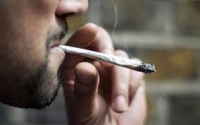Australian Federal Government Drug Tests Claiments
Tuesday 09 May, 2017 Written by Josh Taylor — Journalist Josh Taylor
The Australian federal government has announced plans to trial testing welfare recipients for drugs and will limit the cash they receive from Centrelink if they fail. As part of the trial, announced in the 2017 federal budget on Tuesday, 5000 people on Newstart or Youth Allowance in three locations will be required to take random drug tests to continue receiving their payments from January 1, 2018. The trial will run for two years.
Former prime minister Tony Abbott briefly toyed with the idea of drug testing but abandoned it. In response to questions on why the government was now interested in chasing welfare recipients on drugs, Treasurer Scott Morrison said in his budget lockup press conference that Australians were prepared to support people, but welfare was a two-way street, and the government was prepared to try the drug testing to bring responsibility into accepting welfare payments:
“It’s a trial. We try things. If they work, we keep doing them; if they don’t work, well we won’t keep doing them. I think that is a very pragmatic approach.”
The three locations where the program will be trialled have not yet been decided, but once the program is up and running, the government will profile people on welfare to determine the 5000 test subjects, saying that it will be “based on a data-drive profiling tool developed for the trial to identify relevant characteristics that indicate a higher risk of substance abuse issues”. There was nothing in the budget papers about drug testing the largest group of welfare recipients in Australia, those on the age pension.
Social Services Minister Christian Porter has suggested that the tests will be like roadside drug testing that use swabs for saliva, but he has left the door open for urine testing or hair follicle testing as well. The tests will look for marijuana, ecstasy and methamphetamines including ice.
The testing will be done as part of meetings with the Department of Human Services, but the government plans to outsource the testing. There will be fines imposed for people who refuse to take the test, and those who test positive to drugs will be able to take out less of their welfare payments in cash. The rest will be kept on a card, similar to the cashless welfare card, and can only be spent on certain goods. They will also be forced to take more tests, and if they test positive more than once they will be referred to a doctor for a medical assessment. Those in treatment would then have their treatment count as part of their job plan requirement for work.
Those affected by drug or alcohol abuse will no longer be able to get out of fulfilling their job-seeking requirements because they are affected by drugs or alcohol. Removing this exemption is expected to cost the government $28.8 million out to 2021. Those on the disability support pension on the basis that they are affected by drug and alcohol abuse will also be kicked off the payment from July 1 this year, and the government states in the budget papers that this will save the government $21.7 million out to 2021.
The cost of the drug testing program has not been detailed in the budget because the government states it is commercial in confidence. It is part of several welfare crackdowns in the budget, including those previously announced in The Daily Telegraph this week, including a new “demerit” system for the estimated 100,000 people on welfare who miss appointments for job seeking.
If someone gets four demerit points in six months for missing their job-seeking obligations, they can be pushed into a three-strikes compliance system, in which the strikes are: losing half of their fortnightly payment, losing their full fortnightly payment, and then having their payments cancelled for a minimum of four weeks.
From September 2018, there will be an increase in the activities requirements for job seekers over 30. Those between 30 and 49 will need to do 50 hours a fortnight of activity, up from 30 today and in line with that expected for people aged between 18 and 29. Older workers will only be able to do 15 of their 30 activity hours as volunteer work, while those aged over 60 will need to undertake at least 10 hours annually of volunteer work.
As the government has already announced, there will also be an extension of the controversial cashless debit card, including expanding it beyond the current two trial locations in Ceduna and East Kimberley from September this year. From March 2020, the government will also condense working age payments into one new JobSeeker payment, axing legacy payments including the Widow Allowance, the Bereavement Allowance, the Sickness Allowance and the Wife Pension.
While the Department of Human Services has remained in denial about issues with the Centrelink call waiting times as a result of the automated debt notice debacle, the government has provided $5.5 million in funding to pilot expanding Centrelink call centres by 250 full-time positions, and will require people claiming welfare to provide their tax file number to Centrelink to make it easier to access their income information.
Information held by DHS will also be allowed to be used in criminal proceedings as part of welfare fraud prosecution, the budget papers indicate.
Article courtesy of Crikey.
Leave a comment
Make sure you enter all the required information, indicated by an asterisk (*). HTML code is not allowed.
Join
FREE
Here










